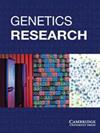基于线粒体相关基因的乳腺癌预后预测及免疫途径分子分析
IF 2.1
4区 生物学
Q4 GENETICS & HEREDITY
引用次数: 2
摘要
线粒体在乳腺癌(BRCA)中起重要作用。我们的目标是建立一个基于线粒体相关基因的预后模型。方法对预处理后的TCGA BRCA数据集依次进行单因素Cox回归分析、随机森林和LASSO方法,从基因集富集分析、基因本体:生物过程基因集中筛选出基因,构建预后风险评分模型。采用GSE103091数据集进行生存分析和ROC曲线验证模型。BRCA数据集平均分为高风险和低风险评分组。比较不同风险评分的临床特征与免疫浸润的关系,并对不同组进行基因突变分析和药物敏感性预测。结果筛选MRPL36、FEZ1、BMF、AFG1L 4个基因构建风险评分模型,风险评分越高,预后越差。单因素和多因素分析显示,风险评分与年龄、M期和N期显著相关。高危评分组基因突变概率显著高于低危评分组。风险评分较高的患者更有可能死亡。不同组药物敏感性预测提示PF-562271和AS601245可能是新的BRCA抑制剂。结论建立了一种新的基于线粒体相关基因的BRCA预后风险评分模型,并确定了BRCA研究的新靶点和药物。本文章由计算机程序翻译,如有差异,请以英文原文为准。
Breast Cancer Prognosis Prediction and Immune Pathway Molecular Analysis Based on Mitochondria-Related Genes
Background Mitochondria play an important role in breast cancer (BRCA). We aimed to build a prognostic model based on mitochondria-related genes. Method Univariate Cox regression analysis, random forest, and the LASSO method were performed in sequence on pretreated TCGA BRCA datasets to screen out genes from a Gene Set Enrichment Analysis, Gene Ontology: biological process gene set to build a prognosis risk score model. Survival analyses and ROC curves were performed to verify the model by using the GSE103091 dataset. The BRCA datasets were equally divided into high- and low-risk score groups. Comparisons between clinical features and immune infiltration related to different risk scores and gene mutation analysis and drug sensitivity prediction were performed for different groups. Result Four genes, MRPL36, FEZ1, BMF, and AFG1L, were screened to construct our risk score model in which the higher the risk score, the poorer the prognosis. Univariate and multivariate analyses showed that the risk score was significantly associated with age, M stage, and N stage. The gene mutation probability in the high-risk score group was significantly higher than that in the low-risk score group. Patients with higher risk scores were more likely to die. Drug sensitivity prediction in different groups indicated that PF-562271 and AS601245 might be new inhibitors of BRCA. Conclusion We developed a new workable risk score model based on mitochondria-related genes for BRCA prognosis and identified new targets and drugs for BRCA research.
求助全文
通过发布文献求助,成功后即可免费获取论文全文。
去求助
来源期刊

Genetics research
生物-遗传学
自引率
6.70%
发文量
74
审稿时长
>12 weeks
期刊介绍:
Genetics Research is a key forum for original research on all aspects of human and animal genetics, reporting key findings on genomes, genes, mutations and molecular interactions, extending out to developmental, evolutionary, and population genetics as well as ethical, legal and social aspects. Our aim is to lead to a better understanding of genetic processes in health and disease. The journal focuses on the use of new technologies, such as next generation sequencing together with bioinformatics analysis, to produce increasingly detailed views of how genes function in tissues and how these genes perform, individually or collectively, in normal development and disease aetiology. The journal publishes original work, review articles, short papers, computational studies, and novel methods and techniques in research covering humans and well-established genetic organisms. Key subject areas include medical genetics, genomics, human evolutionary and population genetics, bioinformatics, genetics of complex traits, molecular and developmental genetics, Evo-Devo, quantitative and statistical genetics, behavioural genetics and environmental genetics. The breadth and quality of research make the journal an invaluable resource for medical geneticists, molecular biologists, bioinformaticians and researchers involved in genetic basis of diseases, evolutionary and developmental studies.
 求助内容:
求助内容: 应助结果提醒方式:
应助结果提醒方式:


